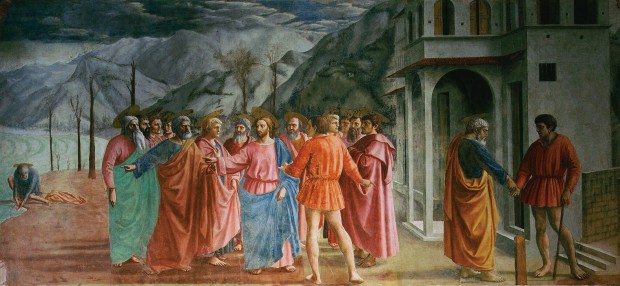Unto God the things that are God’s

XXII SUNDAY AFTER PENTECOST
The Lesson from the Holy Gospel according to Matthew
At that time: The Pharisees withdrew, and plotted together, to make him betray Jesus in his talk. And so on, and that which follows.
From a Homily by St Hilary, Bishop & Doctor
The Pharisees had oftentimes been put to confusion, and were not able to find any ground to accuse Jesus out of anything that he had hitherto said or done. His words and works are, of necessity, faultless, but still, from spite, they set themselves to seek in every direction for some cause to accuse him. He was calling all to turn away from the corruptions of the world, and the superstitious practices of devotion invented by men, and to fix their hopes upon the kingdom of heaven. They therefore arranged a question calculated to entrap him into an offence against civil government, namely: “Is it lawful to give tribute unto Caesar or not?”
But Jesus perceived their wickedness, for in truth there is nothing hidden in the heart of man, but God sees it; and he said: “Why tempt ye me, ye hypocrites? Show me the tribute-money. And they brought unto him a penny. And he saith unto them: Whose is this image and superscription. They say unto him: Caesar’s. Then saith he unto them: Render therefore unto Caesar the things which are Caesar’s, and unto God the things that are God’s.” How wonderful is this answer? How perfect the fulfilment of the Divine Law herein prescribed! So beautifully does he here strike the balance between caring not for the things of the world, on the one hand, and the offence of injuring Caesar, on the other, that he proves the perfect freedom of minds, however devoted to God, to discharge all human cares and duties, by commanding them to render unto Caesar the things which are Caesar’s.
If we have nothing which is Caesar’s, then we have nothing which we are bound to render unto him. But if we are concerned with the things which are his, if we are entrusted by him with the use of delegated power, if we are subject to him as paid servants to take care of property which is not our own, there can be no dispute but that it is our duty to render unto Caesar the things which are Caesar’s. But unto God all of us are bound always to render the things that are God’s, that is to say, our body, soul, and will. These are things which we hold from him, and whereof he is the Author and Maker. It is therefore simply just that they, who acknowledge that they owe to him their being and creation, should render to him all that they are.
